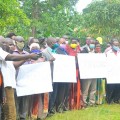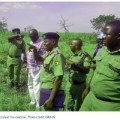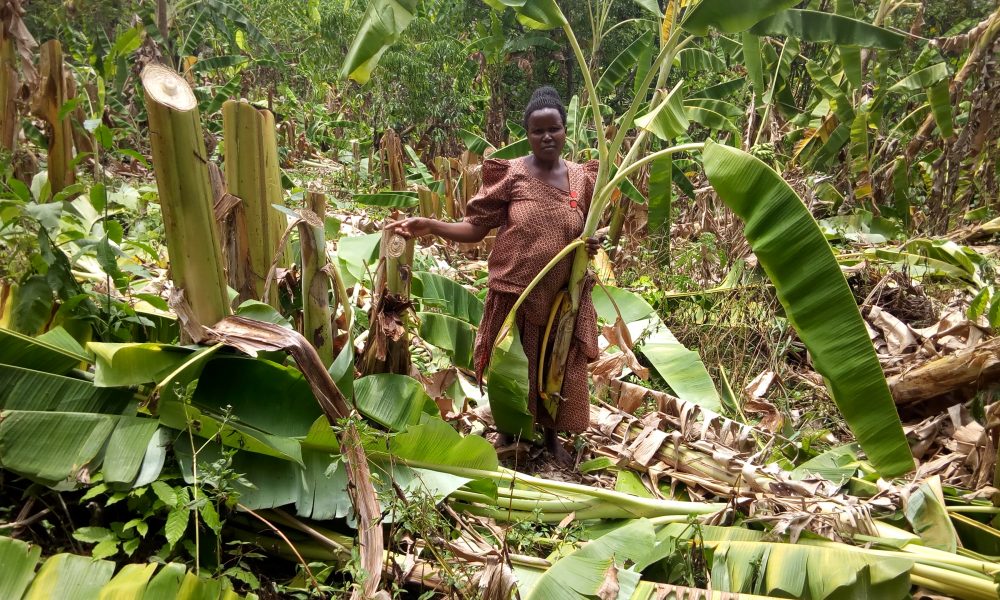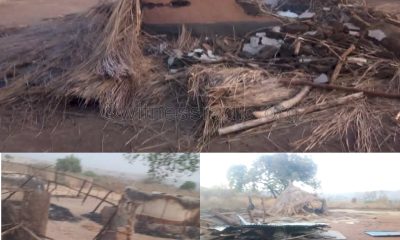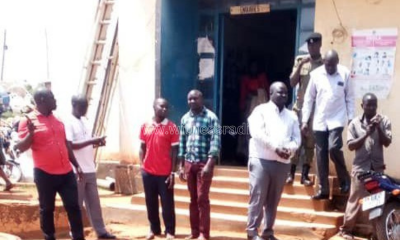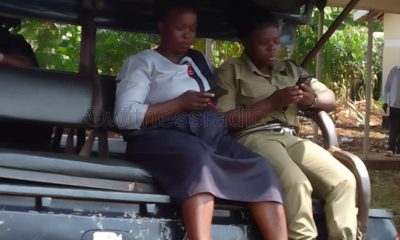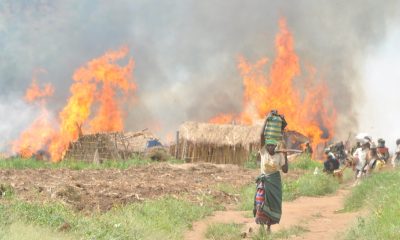A farmer displays banana plants that were cutdown by company workers.
It is now a decade down the road since thousands of people fled their homes in fear for their dear lives. It was a nadir in their lives – the land grab was the lowest moment for the peasant communities. Arrests, charges, malicious prosecutions, convictions, and imprisonment followed. Amidst all these, incarceration was inevitable for the poor and unrepresented accused to pave way for the tree planting company owned by Chinese “investors.”
Despite the forceful and violent evictions of their peers, some of the smallholder farmers have stayed put. Though the fear of an inhumane eviction still lurks around, they are not vacating their land, and are not ready to go down without a fight.
The year 2011 still lingers in the memories of the smallholder farmers albeit being traumatizing. With its violence and forceful evictions of smallholder farmers by a foreign company under the protection of Mubende police came. As we write, the onslaught has “gifted” it with 2590 hectares of forcefully grabbed land that was once a source of livelihood to the poor native communities.
Since then, more than 2000 people have been evicted in more than 12 villages. They include; Butoro, Kyedikyo, Nakasozi, Namayindi, Kitebe, Kisiigwa, Namagadi, Mukiguluka, Busaabala, Ngabano, and Kicucuulo located both in Maduddu and Butoloogo sub-counties, Mubende district. Thousands are still being threatened.
Civic groups, rights activists, and the victims have continuously complained over the company’s long forced evictions nothing has materialized. A clear message from their government is that it does not speak for peasants, a batch of third-class citizens. With government backing, the company has chosen to apply both insidious and overt means to further alienate land from the poor.
As day follows night, the company continues to grow more powerful, and probably, more than the state. Its influence has eaten up the criminal justice system. They follow a carefully crafted script to aid in the land grab. After stripping the smallholder farmers of their source of livelihood – the company militarized land grab and criminalized farming activities of poor peasants. Land defenders were arrested, detained, arraigned before court, and charged with trumped-up charges. Up-to-date they have never been released.
According to Mr. Konyenza Sakali, land conflicts between the smallholder farmers and the company led to the arrest and imprisonment of his father, Mr. Kaberuka Fenehansi for 15 years since 2018 and now fears that the company is targeting him.
“I have always resisted but what they do is to kidnap, arrest and charge you to weaken you and grab your land. My father is now 71 years but because he resisted giving them his land, he is now in jail. He was slapped with unscrupulous charges,” he revealed.
Mr. Kaberuka Fenehansi is one of the seven community land rights defenders that the Mubende High Court sentenced 34 and 15 years in jail respectively. This arose from the unending wrangles and the company’s continued violence and land grabbing that allegedly led to the death of the then Formosa farm manager.
Witness Radio – Uganda appealed against the conviction and the sentence on behalf of the imprisoned community land rights defenders. The hearing date of the appeal is yet to be fixed.
The prosecution alleged that on 17th of July 2018, Ssemombwe Richard, Ategeka Esau, Bukenya Godfrey, Ssebanenya Yona, Sinamenya Paula, Kaberuka Fenehansi, and Sserugo Sam at Butolo village, Maduddu Sub County in Mubende district, unlawfully caused the death of one Tumwine Stephen who was a manager of Formosa Forest Company.
“I have continued to receive reports of forceful eviction of my people on their land without compensation. Days ago, I called the Farm Manager asking him why these actions are continuous but he had no answer. One time I found the Formosa workers uprooting and slashing crops of the residents. When they saw me they took off,” Mr. Ngenda Paul, the Local Council Chairperson of Butolo, one of the affected villages narrated.
Residents said the company either bullyrags them to sell their land or evicts them without fair, prompt, and adequate compensation or resettlement. Through this method, the company has grabbed more land.
“What they do is to coerce some people to sell land to them, when they do it, they then grab the neighboring pieces of land. The next day you find them planting trees on land they claim to have purchased,” Mr. Mukonyeza Sakali, one of the affected residents said.
“What kind of land purchased is that without signatures of the local council leaders? How do you prove that you have bought it when neighbors are not around, what if someone cons you?” the Chairperson asked.
Part of Mr. Mukonyeza’s land was grabbed by the company after forcefully purchased his neighbor’s land. He said he was never consulted or informed when the purchase took place. The father of 10 added that his crops were all slashed, and the following day he watched helplessly as the company’s workers began planting trees.
“They said they shall use all the tactics to evict us from our land which they claim is theirs. Even when we grow crops, they are always destroyed or uprooted by the workers of the company. When we ask why they tell us we have no land. But how can a company which has just come into our country say we have no land. I am 46, and I was born on the land,” he added.
Annet Nannyonjo and a mother of 11 and a wife to Ssalongo Ssemombwe Richard, one of those that were sentenced to 34 years said the company grabbed their land shortly after the husband was imprisoned. She said workers have destroyed her garden of beans.
“We cannot eat trees. They do not want us to cultivate on our land. They steal the little food we grow on a small piece of land left. We used to grow our crops but now we can’t. Ever since my husband was arrested and imprisoned, I am struggling to feed my family,” she added.
Other affected residents added that they are holding grudges over the unending pain caused by the tree planting company.
“Our defenders were jailed and we were left helpless. People who had land continue to wander everywhere. They have nowhere to stay with their families. They have nothing to eat. You imagine what kind of life we are being pushed in,” residents said
But the Formosa farm manager, Mr. Asiimwe Nicholas denied the allegations. He added that the company has never evicted any residents which the villagers oppose.
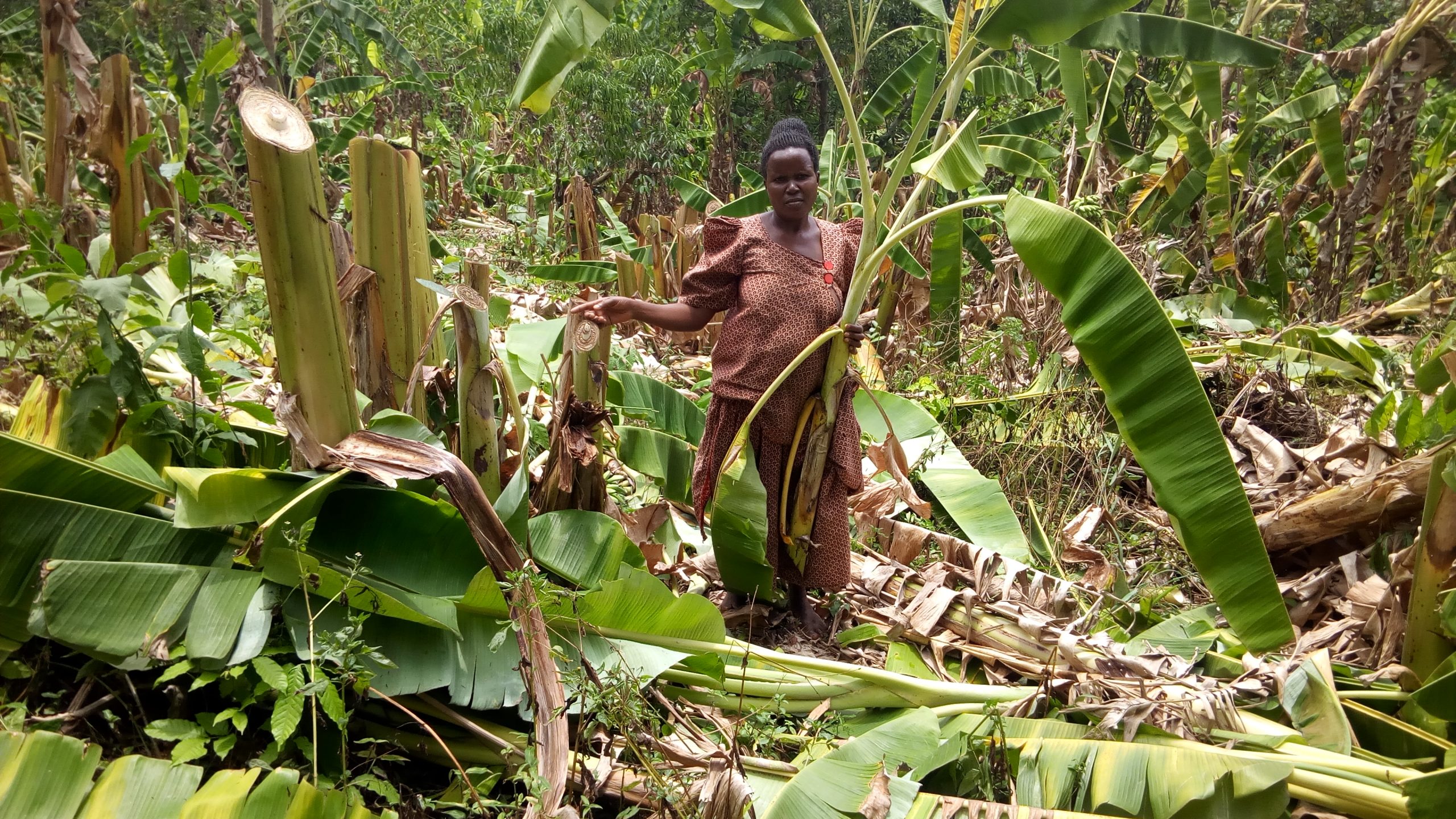

 MEDIA FOR CHANGE NETWORK2 weeks ago
MEDIA FOR CHANGE NETWORK2 weeks ago
 MEDIA FOR CHANGE NETWORK6 days ago
MEDIA FOR CHANGE NETWORK6 days ago
 MEDIA FOR CHANGE NETWORK2 weeks ago
MEDIA FOR CHANGE NETWORK2 weeks ago
 MEDIA FOR CHANGE NETWORK7 days ago
MEDIA FOR CHANGE NETWORK7 days ago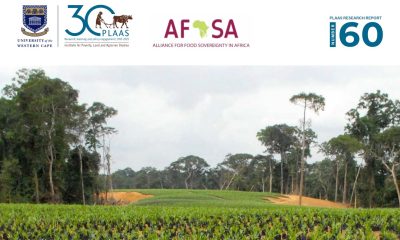
 NGO WORK2 weeks ago
NGO WORK2 weeks ago
 NGO WORK2 weeks ago
NGO WORK2 weeks ago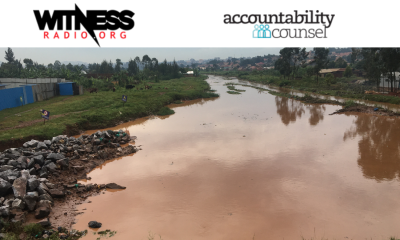
 STATEMENTS2 days ago
STATEMENTS2 days ago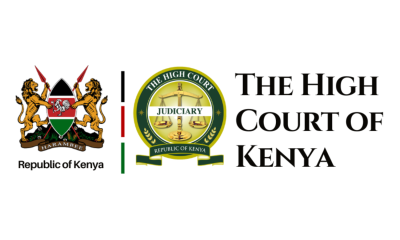
 MEDIA FOR CHANGE NETWORK45 minutes ago
MEDIA FOR CHANGE NETWORK45 minutes ago


